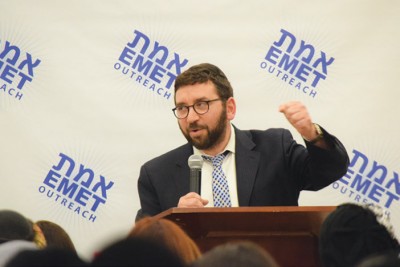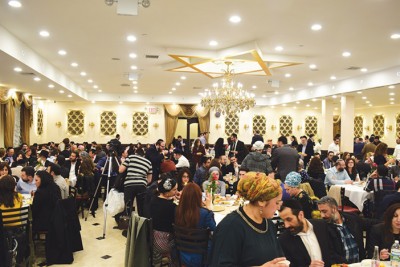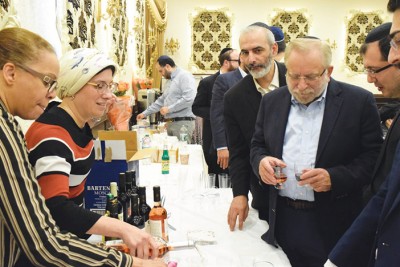



Last week, EMET Outreach held a world-class couples’ event, highlighted by an insightful and uplifting lecture by Rabbi Y.Y. Jacobson, one of the most talented and popular speakers in the Jewish world today. The sold-out event at the Bukharian Center of Jamaica Estates was jam-packed with over 240 guests, and streamed on TorahAnytime.com’s homepage, where an additional 3,000 people watched live.
EMET’s directors chose Rabbi Jacobson because his powerful messages resonate with so many people. “It’s our responsibility to help our over 1,000 members of EMET’s Couples’ Division and thousands of alumni continuously strengthen their commitment to Judaism and develop their relationships,” said Co-founder Rabbi Akiva Rutenberg. In addition to taking place in a beautiful venue, the event featured delicious cuisine, fantastic wine (provided by HaKerem), acapella music, and an uplifting social atmosphere.
Before the lecture, Rabbi Rutenberg shared an update with the crowd about EMET’s recent highlights and events, including three separate EMET Shabbatons that past Shabbos, and programming on five campuses that continues to grow and thrive. He thanked EMET’s ten talented full-time mekarvim and mekarvos, and introduced new members of the EMET team.
Rabbi Rutenberg thanked the generous donors and sponsors in attendance, and singled out the Lena and Richard Harris Foundation as true partners in EMET’s work. He mentioned that one sponsoring family who was in attendance but chose to remain anonymous told him their grandfather, whom the event was dedicated to, was a “man of chessed and truth.” The event was also dedicated in memory of Ben Zakunim Ben Tamara.
Pleasant vs. GoodThe topic was “How to Like the People You Love.” Rabbi Jacobson began his speech quoting the famous pasuk, “Hinei ma tov u’ma naim,” which means “Behold how good and how pleasant.” He pointed out that “good” and “pleasant” often do not coexist. Soybeans and spinach are good, yet they’re not very pleasant. Kugel and kishka, on the other hand, are pleasant, but not necessarily good. Rabbi YY asked if marriage is good or pleasant, and added that the only marriages he knows that are perfect--are the marriages he doesn’t know.
Rabbi Jacobson pointed out--with his trademark satire and candor--that very often in marriage, spouses don’t see eye to eye. There are disagreements, hurt feelings, and swirling emotions. How can one shift one’s perspective to make marriage both good and pleasant?To answer this, Rabbi Jacobson posed another question. We mourn the loss of Rabbi Akiva’s 24,000 talmidim during sefiras ha’omer, who died because they did not treat each other with enough respect. However, we know that Rabbi Akiva taught that the most important principle in the Torah is “V’Ahavta L’reiacha Kamocha” - we must love our neighbor as we love ourselves. How is it possible that the talmidim of Rabbi Akiva did not treat each other properly when their Rebbi embodied the concept of loving one’s fellow Jew?
Rabbi Jacobson explained in the name of the “Shem MiShmuel” that the two concepts, love and respect, are actually very different, and nearly opposites. The word “ahava,” love, has a gematria of 13, which is the same as “echad,” meaning one. Love comes from being “one” with a person. It comes from closeness and similarity.
Respect on the other hand comes from contrast. When we recognize and cherish each other’s differences, we build respect for each other. For example, when a child, student, or subordinate respects a parent, teacher, or authority figure, that does not come from feeling close or similar. It comes from recognizing differences and conducting oneself in the appropriate way because of those differences.
Rabbi Akiva emphasized love, which comes from oneness and a brotherly connection. His students followed in his footsteps. However, respect comes from the midah of appreciating each other’s differences and contrasts. Rabbi Akiva’s talmidim, on their level, fell short in that area, which resulted in their tragic demise.
Rabbi YY went onto explain that parents often experience a related struggle--the fact that their children have similarities and differences to themselves. Why did Avraham Avinu send his servant Eliezer to search for a wife for Yitzchak, as opposed to going himself? Because parents have a tendency to choose the spouse they would want for their children, rather than what’s best for their children.
Avraham married Sarah Imeinu, who embodied strength, specifically to complement his strongest middah, chessed. Yitzchak on the other hand represented gevurah. He did not need what Avrham needed, so Eliezer was sent, an outsider who would be completely objective.
Resolving DisagreementsRabbi Jacobson said that very often the differences in a marriage come from the fact that each spouse is seeing a subjective viewpoint. In other words, both may really be correct, from their own perspective.
To illustrate this phenomenon, Rabbi YY told the true story of a woman who had a bad relationship with her father. He was a chronic complainer, and no matter how hard she tried, she could never seem to please him. Toward the end of her father’s life, the woman decided she would try one more time to bond with him, and invited him on a road trip.
She was driving with her father in the passenger’s seat, and she couldn’t help but admire the stunning landscape surrounding them. She commented to her father about how beautiful the area was, and her father responded by saying, “How can you think this ugly area is beautiful? This place is grotesque.”
Seeing that even in this gorgeous location her father could not help but complain, the woman felt completely dejected. She completely closed up, and virtually gave up on any hope of bonding with her father.
Thirty years later, the same woman was driving with her husband, and the area looked familiar. She remembered that they were in the exact spot she’d driven through with her father 30 years earlier, only this time she was in the passenger seat. She was shocked to see that from her father’s seat, there was a cesspool that was not visible from the driver’s seat she’d been sitting in 30 years earlier.
Needless to say, she felt terribly guilty. Her father was not being negative. He simply saw a different set of facts. Rabbi Jacobson explained that very often in marriage, both spouses are being honest even when they disagree, because they have different perspectives.
Stirring ConclusionIn closing, Rabbi Jacobson related a powerful story about two children during the Holocaust who were separated from their parents and brought to a death camp. While on the train, the 15-year-old sister tried to protect her 8-year-old brother. Then she noticed he’d lost one of his shoes. Frightened and lonely, the stress became unbearable, and she lashed out at her brother for being careless. Although her actions were quite understandable, she ended up regretting that conversation for the rest of her life. When they arrived at the camp, her brother was immediately sent to the gas chambers.
From that day forward, the woman resolved to always speak to people in a way that she would never come to regret, even if it’s the last conversation she ever had with them. The lively crowd that had been laughing throughout the evening, sat there in stunned silence.
Rabbi Jacobson concluded by saying that while it may be a lofty goal, before we speak with the people we love, we should ask ourselves if we would still say what we’re about to say, even if we knew it was the last chance we’d have to speak to this person. It’s one of the most powerful tools we can use to ensure we always say the right thing and show the
proper respect.EMET’s Co-founder and Director, Rabbi Mordechai Kraft, said that Rabbi Jacobson’s lectures use just the right blend of substance and entertainment. “He’s extremely brilliant and insightful, and the points he makes about human psychology and relationships really resonate,” said Rabbi Kraft. He added, “Even his jokes are carefully delivered as a powerful tool that keeps the crowd engaged
and captivated.”
About EMET’s Couples’ DivisionEach year, approximately 50 “EMET couples” get married and start a family. Several years ago, in response to a growing need among alumni for continued guidance, counseling, and Jewish education, EMET launched its Couples’ Division. It offers special events, lectures, shalom bayit guidance, parenting advice, relationship counseling, one-on-one lessons, and other programs throughout the year. The division has over 1000 members and continues to grow each week.
The highlight of the year is EMET’s three-day Couples Retreat, which takes place each Thanksgiving Weekend at a gorgeous oceanfront resort on the Jersey Shore.
To see Rabbi Jacobson’s entire lecture and other EMET videos, visit EMETOutreach.org.
Powerful and Inspirational EMET Couples’ Event Features a World-Class Speaker
Typography
- Smaller Small Medium Big Bigger
- Default Helvetica Segoe Georgia Times
- Reading Mode


